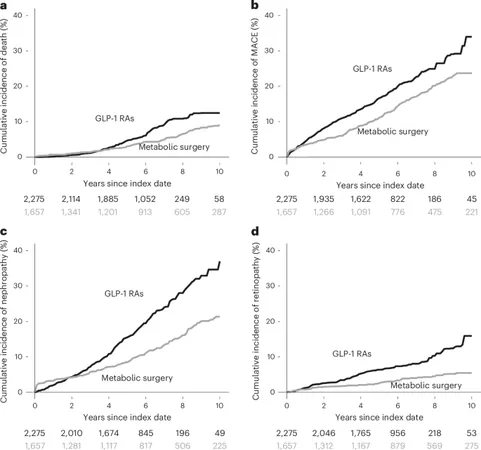
Metabolic Surgery vs. GLP-1 Receptor Agonists: The Ultimate Showdown for Diabetes and Obesity
2025-09-16
Author: Yu
Unlocking the Battle Against Diabetes and Obesity
In the ongoing fight against diabetes and obesity, two heavyweight contenders have emerged: metabolic surgery and glucagon-like peptide-1 (GLP-1) receptor agonists. Both options offer significant improvements in cardiometabolic health, but how do they stack up over the long term?
The Study: Insights from Thousands
A groundbreaking study took a close look at 1,657 patients (65.7% female) who underwent metabolic surgery versus 2,275 patients (53.5% female) treated with GLP-1 receptor agonists. Researchers employed sophisticated methods to fairly compare these groups, scrutinizing essential outcomes like all-cause mortality, major adverse cardiovascular events (MACE), as well as kidney (nephropathy) and eye (retinopathy) health over an average follow-up of 5.9 years.
Stunning Results: Metabolic Surgery Takes the Lead
The findings painted a compelling picture. Among those who underwent metabolic surgery, the 10-year cumulative risk of all-cause mortality stood at 9.0%, compared to 12.4% for the GLP-1 group. That's a significant difference that translates to an adjusted hazard ratio of 0.68—suggesting a lower risk of death for surgery patients.
Victory in Cardiovascular and Renal Health
But the good news didn’t stop there. Metabolic surgery also showed a reduced risk for serious cardiovascular issues (adjusted HR of 0.65) and kidney damage (adjusted HR of 0.53). Eye health didn’t fare better for the GLP-1 group either, with metabolic surgery patients facing a much lower risk of retinopathy (adjusted HR of 0.46).
A Clear Choice? What's Next for Patients
These groundbreaking results suggest that metabolic surgery may outshine medical treatments such as GLP-1 receptor agonists, even in today's therapeutic landscape. However, researchers are calling for future investigations that juxtapose these findings against newer, more effective GLP-1 options promising enhanced weight reduction.
The Takeaway: Choosing the Right Path for Health
With such compelling evidence, the future for diabetes and obesity treatment looks even brighter. As patients and healthcare providers consider options, understanding these results could guide more informed choices in the fight against metabolic disease.

 Brasil (PT)
Brasil (PT)
 Canada (EN)
Canada (EN)
 Chile (ES)
Chile (ES)
 Česko (CS)
Česko (CS)
 대한민국 (KO)
대한민국 (KO)
 España (ES)
España (ES)
 France (FR)
France (FR)
 Hong Kong (EN)
Hong Kong (EN)
 Italia (IT)
Italia (IT)
 日本 (JA)
日本 (JA)
 Magyarország (HU)
Magyarország (HU)
 Norge (NO)
Norge (NO)
 Polska (PL)
Polska (PL)
 Schweiz (DE)
Schweiz (DE)
 Singapore (EN)
Singapore (EN)
 Sverige (SV)
Sverige (SV)
 Suomi (FI)
Suomi (FI)
 Türkiye (TR)
Türkiye (TR)
 الإمارات العربية المتحدة (AR)
الإمارات العربية المتحدة (AR)